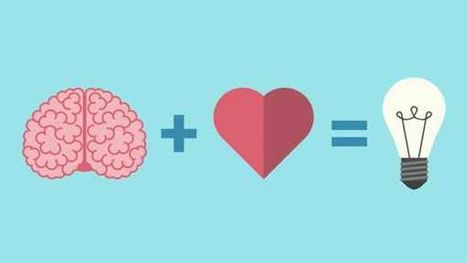 Your new post is loading...
 Your new post is loading...
Worrying about deadlines, work flow or employee issues is natural for people working in the business world. Stress happens. You have options, though, on how you deal with stress. Sometimes, taking a moment to recenter yourself is all you need to do: By putting things into perspective, you can find the grit to keep going. That’s not always the best course of action, though. If you find that a particular task or job regularly leaves you feeling overwhelmed, drained or quietly angry, you may want to rethink how you approach the work or even consider whether you’d be better suited for a different sort of job or different company.
Via The Learning Factor, Bobby Dillard
Packing your beach bags? Firing up a grill? Now’s the time for leaving work concerns at work and skipping off someplace where you can relax, regenerate, let loose, and just have fun. The idea of doing anything that even remotely reminds you of your job probably doesn’t seem too appealing—and that’s fine. But even so, your vacation doesn’t have to be dead time when it comes to self-improvement. Before you roll your eyes and click or swipe out, there’s good news: You can boost your skills while relaxing and de-stressing. In other words, your vacation can be a great time to improve your emotional intelligence—and still thoroughly remain in vacation mode. Since that’s one of the most important job skills on the market right now, it’s worth taking a page or two from the most emotionally intelligent vacationers’ play books.
Via The Learning Factor
Why do some people have more emotional intelligence (EQ) than others and how do we measure EQ?
Releasing anger and frustration can actually help you regain control over a hectic day or win back productivity after feeling frazzled. But you have to do it in a mindful way.
Via Anne Leong
If you have these characteristics, did you know you also have high emotional intelligence?
Via Marc Wachtfogel, Ph.D.
What is learning? It’s a process of growth… starting at a neurological level, new connections forming… At work, in life, and hopefully in every classroom, people are working to teach and learn. It’s a mental process — but current neuroscience confirms learning is also physical, social, and emotional. Are you someone committed to learning and helping others learn? If so, perhaps you’ve considered:
How does learning work best?
In the Six Seconds community, we’re starting this year focused on this big question and understanding the role of emotions and emotional intelligence as our brains build new insight and meaning. The adventure starts now with five essential highlights (plus inspiring learning quotes) below.
Via David Hain
Successful people come from all walks of life, yet they all have one thing in common: where others see impenetrable barriers, they see challenges to embrace and obstacles to overcome. Their confidence in the face of hardship is driven by their ability to let go of the negativity that holds so many otherwise sensible people back.Obstacles do not block the path; they are the path. This perspective helps successful people to think differently to everyone else, which is important, because if you think like everyone else, no matter how smart or experienced you are, you’ll hit the same ceiling. By thinking outside the box and going against the grain, successful people rise above their limitations. And it all starts with their morning routines. Here’s how ultra-successful people utilize the first hours of the day:
Via The Learning Factor
Emotional intelligence, also known as EI or EQ (for Emotional Intelligence Quotient), describes a person's ability to recognize emotions, to understand their powerful effect, and to use that information to guide thinking and behavior. Since EI helps you to better understand yourself--and others--a high EQ increases your chances for successfully achieving goals. But is there a way to increase your emotional intelligence? In their seminal research and publication, The Emotionally Intelligent Manager, professors David R. Caruso and Peter Salovey broke down four of the core skills involved in developing emotional intelligence: 1. Identifying your feelings and those of others 2. Using feelings to guide your own thinking and reasoning, along with others 3. Understanding how feelings might change and develop as events unfold 4. Managing to stay open to the data of feelings and integrate this into decisions and actions
Via The Learning Factor
The amygdala is part of the brain for many of the higher vertebrates and it regulates the fight or flight response that is key to the survival mechanism for many animals.
At the moment a threat is perceived, the amygdala can override the neocortex centre of higher thinking, and initiate a violent response.
In the wild or in the presence of actual physical threats, this can be a life-saving function.
In ordinary day-to-day living, however, this amygdala hijack can inspire impulsive responses we may live to regret.
‘Advanced common sense’
Fortunately, there is a way of avoiding this hijacking.
Via David Hain
Most people won’t admit it, but we size up other people's characters all the time. In fact, research suggests that it takes just 30 seconds to make up our minds about someone’s intelligence and personality (we make other assessments even faster) and that these evaluations are surprisingly accurate. In one study, researchers showed participants short videos of different couplesinteracting, and participants were able to detect which individuals had cheated on their partners. Likewise, observers watching videos of randomly selected speed daters were able to infer participants' level of romantic interest. Even when the people being evaluated are children, observers can infer their character with a similar degree of accuracy than the children’s parents do. So the idea that you can’t judge a book by its cover is inconsistent with the evidence: People, it seems, are fairly transparent and we can see through them pretty easily and accurately
Via The Learning Factor
Emotional Intelligence (EI or EQ) has been a hot Inc. topic written by many of my colleagues. I've also registered my thoughts on the power of EQ in leadership, or how to respond with emotional intelligence to people who push your buttons. But ask any scholar and they'll tell you the study of EQ has not had a smooth history. It has been debated since the mid-1990s over its effectiveness as an evidence-based leadership model, or as a predictor of job success. Sure, I agree that in many professions -- some higher-level teaching, medicine, accounting, engineering, and other highly-technical professions -- IQ still remains the best predictor of job success. 9 Questions You Need To Ask Daniel Goleman, the foremost authority on emotional intelligence, has put together these questions to help you evaluate your own emotional intelligence, and get you thinking about your strengths and limitations in EQ. Are you usually aware of your feelings and why you feel that way?
Via The Learning Factor
|
What’s the point of networking if not to get other people to like you? Sure, you need new contacts to see you as interesting, competent, professional, and potentially valuable to them—but if they don’t also find you likeable, nobody will feel motivated to reach out later and work with you. The reason why all comes down to emotional intelligence, the set of skills and qualities that allow people to form deeper, closer relationships with others. Likability is a key ingredient in that, and its career benefits are pretty obvious. For instance, being likeable—and liking your coworkers in return—can increase your chances of getting promoted. But when it comes to first impressions, you don’t always have much time to get people to like you. So here are a few straightforward things that the most emotionally intelligent people do to cement their likability from the get-go.
Via The Learning Factor
A few weeks ago, after receiving a 21-page PDF report breaking down my so-called “emotional intelligence,” I did the logical thing and forwarded it to my boyfriend. He glanced at the list of categories on the second page and exclaimed—before reading my results—”Flexibility, uh oh!” The report was the result of an assessment I’d taken three weeks prior called the EQ-i 2.0, which is based on nearly 20 years of research and has been taken by some 2 million people—and sure enough, it told me I’m about as inflexible as people close to me seem to think I am. Shortly afterward I scheduled a call with its developer, Steven J. Stein, who reviewed my results and offered this suggestion: “I would start looking at how you operate—what your routines are, how you get through a day.” When I asked him for an example of a routine I might want to shake up, he said, “Like, eat a different breakfast or something.”
Via The Learning Factor
When emotional intelligence first appeared to the masses, it served as the missing link in a peculiar finding: people with average IQs outperform those with the highest IQs 70 percent of the time. This anomaly threw a massive wrench into what many people had always assumed was the sole source of success—IQ. Decades of research now point to emotional intelligence as the critical factor that sets star performers apart from the rest of the pack.
Via Anne Leong
Emotional intelligence isn't about achieving perfection. It's about learning and growth.
Performance reviews have been reportedly going extinct for quite some time. But they aren't completely in the grave yet, and maybe they shouldn't be. Despite the dread with which many employees greet their year-end evaluations,psychological studies have shown that people still generally find them useful—as long as those reviews offer a chance to discuss relevant issues, outline key objectives, and provide constructive feedback. But for that to happen, you need to go in prepared. In fact, you may think the biggest factor in your success is how you perform throughout the year, but your manager may know less about how well you're actually performing than you may hope—meaning your annual review might count for more than you imagine. That can be good news for you, though. These are three tips, based on some fundamentals of human psychology, to help tilt the field in your favor.
Via The Learning Factor, Kevin Watson
Emotional intelligence predicts people’s ability to regulate themselves, manage other people, and achieve success. Research shows a link between emotional intelligence and career success. Not everyone is born with it, but unlike IQ, emotional intelligence can be acquired and improved with practice. So, how can we tell if someone’s got it or not? Here are five signs of people with high emotional intelligence. These are qualities that are easy to assess in every day situations. Sign No. 1: They handle criticism without denial, blame, excuses or anxiety. One of the hallmarks of high emotional intelligence is self-awareness. Self-awareness is a deep understanding of what makes us tick; what angers us, makes us happy, bores and interests us. It’s also means that we can appraise ourselves, faults and all, with great honesty and clarity. So when people with high emotional intelligence make a mistake and get criticized for it, it doesn’t send them into an emotional tailspin. It’s simply a fact to be noted, analyzed and corrected.
Via The Learning Factor
Getting in touch with your emotions (and those of others) can be a challenging process.
Via Anne Leong
Emotional intelligence helps you build strong relationships with those around you. These habits will strengthe
Via Anne Leong
|



 Your new post is loading...
Your new post is loading...









































Adopt stress-relieving habits to improve productivity and happiness down the line.